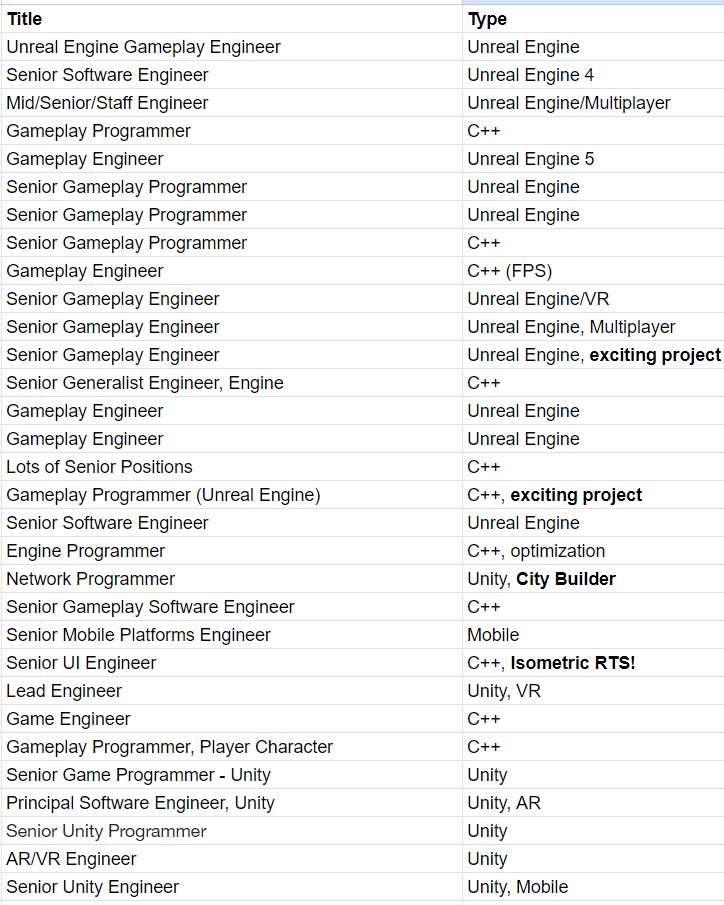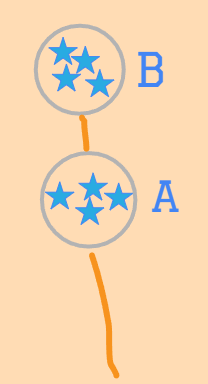Do Job Research
You're searching for a game job.
Your first one? Pivoting from a different industry? Seeking a healthier work-life balance? A better salary? A challenge?
You need to do job research. Everyone needs to do job research.
This is an in-depth walkthrough of my method. I’ve included the why, a helpful analogy, my process, and how to use it when applying.
What is Job Research?
Job research is simply finding positions you may want, then categorizing and prioritizing postings by looking at them as a group. This directly feeds into a short-term plan of how to effectively prepare.
Job research answers some of the most common questions I get from people seeking advice.
What side project should I work on to boost my resume? Which game engine?
What skills are companies looking for?
How can I improve my interview chances?
Why is my resume getting ghosted?
Why do it?
You must respond to the current job market and your current skill-set in a short amount of time. Get a job in 3 months, not 3 years.
Doing the wrong preparation/projects will cost months of time.
Interviews are stressful and sap most of your mental energy. Doing the wrong interviews will drain you.
Picking a company you hate can take years to get out of. High lost opportunity cost.
Companies reveal how to interview better through requirements and resources. You can leverage these at a higher level to give yourself an advantage when applying to clusters of jobs. Be a better candidate, do less work.
My Results
During my last job search (in late 2022), I used this process to:
Shorten my interview preparation by 50%.
Pivot my focus. I switched from Indie to AAA and Unity to C++ with a careful, targeted study plan.
Refine the stories I told during my interviews to closely match job requirements.
Get 8 callbacks, 5 job offers from just 11 applications. Accepted a job at Riot, well aligned with my goals!
Pretty efficient, right?
Of course, less experienced engineers won't get the same application hit rate. But, I'd argue your benefits from this research will be greater. You will use the job market to make smart preparation decisions beyond your experience level.
I was entry level once too. I applied to 100+ jobs, taking 5 months before my first callback. This post is the advice I wish I had.
Plan Check
Preparing or already applying? Here’s a quick test.
Does the job you are preparing for exist, right now, in reality? Can you show me a link of a real, actual job posting that represents it?
What is the job title and level of the position you are looking for?
Does more than one job posting with that title exist? How many?
What positions fit into a plan A and plan B of your potential applications? What job requirements are unique to each category?
What are the most common requirements in the jobs you want? Which ones do you not have?
Answers to these are the fundamental building blocks of app/interview preparation.
I often talk to people who are actively applying. Around half them can't answer even 1 of these questions.
This is scary. Let's change that.
Job Mountain
Imagine for a moment. You are a climber planning a path to find jobs scattered among a vast mountain range. There are many paths to choose, but not all will lead you to your destination.
The Impossible Path
The rookie climber wants to reach every job they see. They've gotten lots of differing advice from school, colleagues, and recruiters, so they generate a ridiculous backlog of projects and study lists that would realistically take decades to complete.
Some people don't do enough research to even know what's on the mountain. Their impossible path is filled with dead ends, preparation that doesn't lead to a job at all.
The worst thing you can do is follow an impossible plan, because you'll fail your interviews and fail yourself. It's not possible to be a great fit for every job, you need to be smarter than that out of respect for your own time.
The Unicorn
Motivated but foolhardy climbers spend immense time preparing to apply to a single "unicorn job". A hyper-competitive internship at their favorite studio. A job description they aren't remotely qualified for.
Give it a shot, apply! However, investing time to prepare for a single opportunity is a pitfall of luck and leaves a lot out of your control.
Another candidate can land an offer before you, leaving you without a chance
The hiring manager is a jerk and denies you for a stupid reason
You realize the position isn't a great fit during the interview
The company does budget cuts, layoffs, and removes the job posting
Avoid this risky path. Look at the broader mountain to create a more realistic strategy, one that may include your target job and more.
Categorize, Prioritize
The smart climber finds clusters on the mountain and only climbs directly to ones with several jobs with related requirements. If that doesn't work out, they take a short path to another, nearby cluster of jobs. They know their climbing limits and only take paths carefully and deliberately.
You don't climb all over the mountain because it's not realistic.
You avoid the danger of bad luck by qualifying for many studios.
Job research gives you all the tools you need to plan safe, direct paths to strong clusters of jobs.
The Process
Job research is not complicated. Here's the process I use.
Find job openings I could potentially apply for
Look for job clusters with similar requirements
Prioritize clusters by my interest and preparation work involved
Improve my portfolio to qualify for my top clusters
Let’s start with finding jobs.
Step 1 - Gather Job Openings
Job postings answer what skills companies want. In aggregate, they can be used as project objectives and preparation hints.
I search for jobs I'm qualified for or could up-skill myself to reach with some work. If I'm unsure if it belongs, I put it in my sheet anyway.
I use Google Sheets. Here's a template, feel free to copy it!
I make a row for each job I find.
Title and Type will help me cluster them later.
Studios with No Current Openings
No job opening but cool studio? I save them on a second sheet.
I can return to these at the application stage and see if any opened up.
Job Resources
Here's places you can find lots of jobs:
https://twitter.com/ (for indie studios)
Amir Satvat's Resources
This didn't exist when I last applied, but it's the resource I'd use now. It has a spreadsheet of the largest and best maintained collection of jobs I've seen.
Work With Indies
A newer website that looks really promising. I like its searchability and focus on finding hidden gems in the indie space.
GameDevMap
I've used this site often. My process is simple, I click on Los Angeles, where I live, and open every company's career page. That's 366 companies for me.
Any website that has company career pages will work the same. The thing I don't like about these types of websites is hitting numerous companies with no openings I'm interested in, so that is why I recommend Amir's searchable spreadsheet and Work with Indies.
Twitter/X/whatever is the best place I've found to discover indie companies, especially when less than 3 people or no website. Look at the following list of an indie developer you like and you will find a half dozen other indies you've never heard of.
For example:
Let's say I already like Yacht Club Games. I go to their careers page. They have a quote from their lead programmer.
I go to the person’s twitter and look at his following https://twitter.com/dandyycg/following.
I see the CEO of Deviation Games or inExile. I've never heard of them, I look at their careers page, and the CEO's following on Twitter.
I find a new company, Snapshot Games.
I continue looking through webs of people, finding career pages or indies I can directly contact. Some of them even have posts of open jobs!
Another jumping point is Devolver Digital's games page. These connect to a larger web of promising indies.
I don't use LinkedIn as much for discovery but it’s another tool. Active posters like Amir Satvat can lead to more resources.
I have not tried any of LinkedIn's premium features.
Beyond Job Postings
There are some other ways I use to gather information.
Read the company's website, especially a values page or tech blog for hints.
Find public company resources for applicants. Examples:
If the studio is big, you can contact an internal company recruiter and ask them questions. They don't just process applications, they also try to attract candidates and generate leads.
They are likely MORE than happy to clarify job requirements and give you preparation tips if you treat them respectfully and ask specific questions about qualifications and company values. Never beg for a job.
Networking
Networking is great job research, and I’ve gotten several job offers from referrals or meeting people at game development events.
Still do wider checks to understand the cluster your networked job is in, so you can better prepare for the interview.
Use job research to understand if the opportunity is right for you. Don’t put yourself in the desperation mindset that a possibly-easier-to-get-because-you-were-referred job is a good job. Even a quick scan of the job market can save you from making a poorly-informed decision.
Common Questions about Finding Jobs
What if I don’t know what title to search for? I am interested in everything/I wore many hats before.
I am so glad you’re here, job research is exactly what you need.
Start the search with “engineer” (or any other disciplines).
Read descriptions and record interesting ones, regardless of title or level.
Do this until you have 50-200 of them.
Prioritize by interest and review the top 10-20.
Lots of the same 1-3 titles or responsibilities? Some jobs at your level of experience? Great, you now have an indicator of what to go for.
Same titles but no jobs at your level? This may be a long term plan. Look for jobs with overlapping responsibilities with your dream. Also see the Viability section.
No titles in common? Do more research on your top 10. Search for day in the life videos on YouTube. Talk to people in industry. Narrow a focus for the next 1-4 years. A title is temporary, experience will open doors to new jobs.
I need 1+ month to study/prepare. Won't these positions be filled?
Yes! This is not my final application list, first I have to analyze real jobs from the marketplace. During preparation, some jobs will be filled, other new ones will open up. That's ok.
What can I potentially apply for? I don't qualify yet.
I use a 60% rule. if I can meet 60% of the requirements by the time I apply, and I have 60% of the required years of experience, I can put it on my spreadsheet.
The requirements I don't meet are exactly what I'm looking for to create a smart preparation plan.
When I actually apply, I will also apply to jobs I technically don't qualify for. See the numerous articles on why you should too.
Step 2 - Cluster
I've now filled in a spreadsheet of dozens, potentially hundreds of jobs I could see myself applying for. I can start to understand the shape (and pitfalls) of my job mountain.
Check Priorities
Let’s unlock our first insights. I recommend getting a prioritized top 20 list by:
Interest level - Which jobs are my top interests?
Qualifications - how close am I to meeting the requirements?
Consider your initial reaction. Do these already look like an application plan? Are they disappointing? How do they compare to one another? Take a few notes.
Clustering
I group my jobs into clusters. Clusters are jobs with commonalities in many requirements or duties.
This isn't a formalized process. This is spit-balling ideas and looking for insights. Some of these I finish in minutes, others I may think about and refine for several hours. Be creative and think of ways to answer your own questions here.
For example, the jobs I like all use engine A. They are mostly AAA. Most mention 3D math.
On my job sheet, I look at common requirements. Are they shared between multiple positions?
Senior Gameplay Engineer?
Unreal Engine?
AAA? Indie?
Mobile? Console?
I search for keywords and trends, like:
There's a lot of gameplay engineer. Other options are generalist, engine, UI, networking, and VR focused.
I see primarily senior level.
There's Unreal, proprietary C++, and Unity game engines.
There's a few jobs I'm especially excited about, Which requirements are similar which I don’t meet?
I move rows around into potential clusters.
Let's move the Unreal, C++, Unity rows together. Which of those clusters has my favorite jobs in them?
Digging into Requirements
I pull some detailed postings into a second page to scan for common requirements I missed in my main sheet.
I move jobs in and out of clusters (usually just groups of rows, nothing too scientific). I use the rubber duck method to ask questions about my work, pretending I’m my own career coach.
Could we combine any of these clusters? Split them up?
Is there any low hanging fruit you could learn in a couple weeks? Behavior trees? A profiling tool? Update a keyword on my resume?
How much do they prioritize game engine experience? Do they say "extensive experience" is required? How might that change their interview process? How might that change your preparation?
This questioning and re-configuring process seems to unlock many valuable observations about how I could prepare.
A good, healthy cluster to me is 5-20 jobs, which balances preparation effort vs # of jobs unlocked. Too few and you have The Unicorn Job problem, too many and you have The Impossible Path, with too many requirements to prepare for.
Step 3 - Prioritize Clusters
My goal is to order which clusters I want to prepare for first.
Here's an example of how my prioritized clusters end up.
Cluster A includes 5-10 jobs I'm most excited about and already have strong potential to qualify for.
Cluster B and C I'm also interested in, but definitely don’t qualify for. Each has a different set of skills I'd need to study for and modify my resume. Each has 5-20 jobs.
Other jobs may have high requirements, aren’t that exciting after all, or aren’t in an obvious cluster. I'll return to them if my top clusters don't work out.
Make a Plan B
Determine a logical order of which clusters to climb to. Most importantly, pick what clusters to NOT climb to immediately. A harder to reach cluster can become a Plan B (or C).
First you'll do work to qualify for Cluster A jobs. Then, if that doesn't work out, you'll invest more time for Cluster B.
For example, in my last search, I found two clusters, "proprietary C++" and "Unreal" jobs.
Problem was, I wasn’t qualified for Unreal or C++ jobs. I’d been working in Unity for years.
It wasn't possible for me to hit these two clusters with the same study plan. I decided proprietary C++ was my Cluster A and Unreal was Cluster B.
I would first prepare by leveling up my C++ fundamentals. If I had no luck, I would invest some months into learning Unreal to give me a better chance at Cluster B.
The funny thing is, I ended up getting multiple job offers in Unreal Engine anyway. If I'd have prioritized Unreal prep, I would have wasted months doing unnecessary projects. Focusing on the highest value preparation was enough.
Viability
Less than 12 jobs on your job sheet? Priority clusters with less than 5 jobs? These are red flags that indicate your net is not wide enough.
Consider relaxing a constraint, down-leveling, relocating, a related position, something that gets your numbers up.
You consider a longer term plan that reaches a tangible cluster of jobs.
Every cluster is a job market of skills
The fact that related jobs exist means there is market support for those skills. If a job is filled, another will probably open soon after. This is a healthy market to be in.
A job outside of a cluster isn’t effective to prepare for. Those skills aren't transferring to other studios. You can “moonshot” apply, but keep the lens of realism in mind when setting expectations.
Step 4 - Prepare to Apply
Preparation can involve a project, learning new skills, or doing practice for specific interview stages. This is a deep topic worth of it’s own article, but for now let’s go into how our clusters informs preparation choices like these.
Consider the skills you don't have in your clusters. What will it take to level those up past the 60% rule? Can you form a 1-3 month plan?
Which clusters are low on the mountain, closest to your existing skillset?
Target Clusters
Any preparation work you do should be for a specific cluster of jobs. This will save you LOTS of time and make you shine in those interviews.
Have compassion for yourself and give yourself a reasonable schedule that you can follow.
It took me 4 years of professional development to become what I consider an experienced Unity programmer. This would not be a realistic 2 month goal to prepare for a job search.
Only pick tasks that are reasonable for a job search's timeline and directly benefit you. For example:
Learning one feature within a game engine
Completing a project with a specific tool
Studying chapters of a textbook or online resource around one skill
You can acquire multiple skills in one project, but don’t fall into the Impossible Path of preparing for everything you can think of. You’ll spread yourself too thin and end up with nothing worthwhile for the interview.
Not every job posting needs preparation. If you’re already qualified, skip straight to applying. Only do preparation you need to improve chances of passing an interview.
Update Your Resume
As you've seen from this process, fitting job requirements is important.
You should update your resume with skills gained during your preparation and experience stories that closely match the requirements.
The power of clusters is that you gain a bigger picture of requirements from related jobs. If in the same cluster, even jobs that don’t list the same requirement will often value that common skill. Finding and developing these skills will give your resume a huge boost for every job in that cluster.
Applying
When I am ready to apply, I refresh my job list. I move closed positions to the bottom and add any newly opened positions in.
I use a “status” column to track my application progress.
I use the clusters to inform my applications.
However, I DON'T go down the list purely in order. Actually, I typically first apply to a few companies from each cluster!
I will use some Cluster B, C, D… companies to test the waters and get interview practice. I might also find a job I like!
I save some Cluster A companies for if I don't get a good signal in my first interviews. I may need to improve my resume or do more preparation to pass them.
Save at least a few good companies as post-feedback backups. If you exhaust your list with rejections, you will have to look for new jobs as they are posted or wait 6 months to re-apply.
Rejections
It generally takes several rejections to practice and gather enough information to really know what to work on. Getting rejected is normal and improves you in subsequent interviews.
Applications + interviews are job research. When you interview, pay attention to what stages you do well, and what stages you do poorly. Refine your job list and clusters as you go.
The most painful signal is silence at the application stage. This is a signal that your application materials are insufficient. Job research should be a blueprint for how to revise it and gain skills that increase your chances. This and direct feedback from a recruiter/mentor are the strongest methods I know to remedy this.
Don’t spam the same resume 500 times. Improve the quality by targeting clusters, applying in batches, and learning from the results.
Overlapping Steps
You can and should overlap your steps! For one, job research can be tedious. After 2-3 hours a day of it I need to do something else. Here’s how my steps overlapped:
I started doing basic, necessary interview prep the same day I started job research.
I started clustering while continuing to add jobs I found.
I started applying early, because even a callback can take several weeks or months.
In total I spent 20 hours researching jobs, updating my resume, and sending out applications. It might take you less, maybe more. Finding and categorizing job postings is work, but it pays off.
Why this Process Works
The process has steps that prevent the most common mistakes.
Investing time into projects that don’t improve a resume
Confusing recruiters with unclear career objectives
Applying to the wrong jobs
Getting stuck after first round of rejections
This process facilitates spending thinking time in a valuable space. Going through structured activities tricks encourages your brain to re-evaluate plans and goals in a practical way.
You have finite skills and time. The industry has a market of real jobs to fill. Clustering and prioritizing maps the two together, and identifies gaps between them. These gaps are where preparation time should go.
Final Thoughts
Job research isn't complicated. It involves finding, categorizing, and prioritizing the steps you take to prepare and apply for jobs. If anything it's boring, and that's the main reason why many people don't do it.
However, job research gives you an accurate, personalized, up-to-date understanding of how your skills fit into the job market, and that knowledge informs how you spend your time and what short term career goals are realistic.
Past the wall of information are really useful insights that come only after spending your thinking time in the right space. Relationships become apparent.
Just as we prioritize and cut game features we can prioritize and cut preparation time, and this process improves the final product.
I hope your final product is a beautiful and rewarding job.















